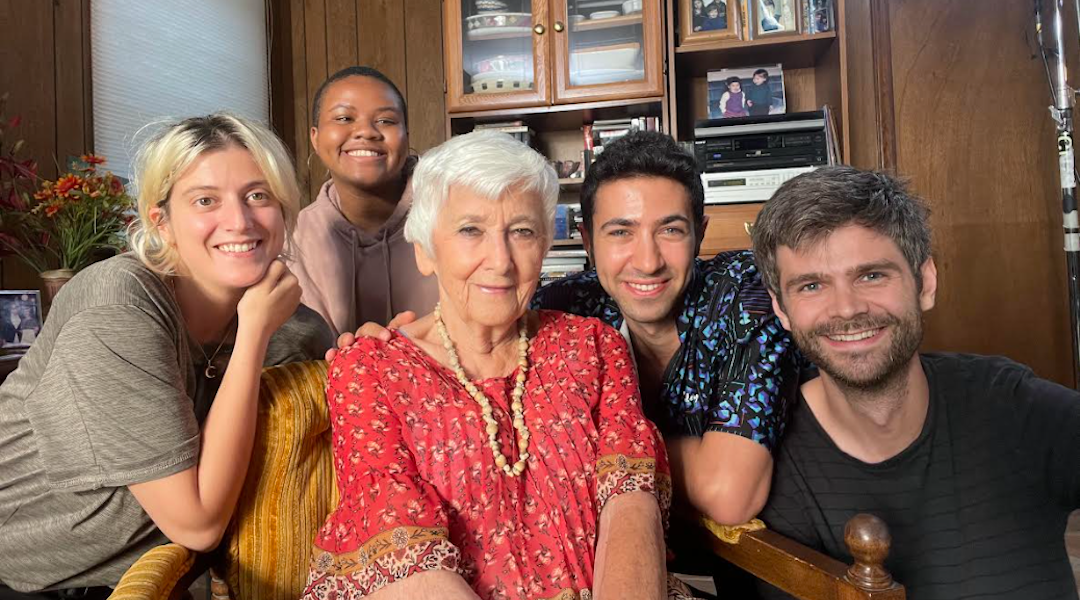Nina Gottlieb, Holocaust survivor who told her story in an award-winning documentary, dies at 91
Her grandson’s film represented the first time she spoke about her experiences after nearly eight decades

Daniel Lombroso, second from right, with his grandmother Nina Gottlieb on the set of “Nina & Irena.” (Courtesy of Lombroso)
(JTA) — Nina Gottlieb, who broke eight decades of silence about her experiences during the Holocaust in an award-winning documentary that aired in 2023, died Feb. 4 in Manhasset, New York. She was 91.
In “Nina & Irena,” a New Yorker film made by her grandson Daniel Lombroso, Gottlieb opens up about her childhood in Kielce, Poland, and her relationship with her sister, Irena. She relates how she lost about 25 members of her family, including Irena. Only she and her parents survived.
The film, which made its New York City debut at the Museum of Jewish Heritage in July 2023, has been a success on the festival circuit, including winning best short film at the Mountainfilm Festival in Telluride. The documentary festival DOC NYC included it among its “Short Lists” predictions for top contenders for Oscars and other awards.
In December, Gottlieb was invited to celebrate Hanukkah with Kamala Harris at the vice president’s residence in Washington, D.C.
“The film is about the richness of her life,” Lombroso, a staff filmmaker at The New Yorker, told JTA last year. “There’s a lot of what they call Holocaust fatigue that we all grew up watching a lot of Holocaust films and hearing from survivors and you expect certain things. You expect the train tracks and you expect Auschwitz and smoke and it was very important for me to not necessarily avoid the horrors — you have to understand the horrors — but also balance them with the comedy of her life. She’s so funny.”
Janina Vogel was born on July 11, 1932, in Kielce, and was 7 when Hitler invaded the country. Her immediate family was interned in the Warsaw ghetto and survived, she says in the film, in part based on her father’s ability to talk himself out of danger. Irena, six years older than Nina, had meanwhile taken a train to Ukraine in search of other relatives, and was never heard from again.
After surviving the war, the family lived in Prague and Paris, and came to the United States in 1951. She met Stan Gottlieb on Brooklyn’s Brighton Beach in 1952 and married him in 1953. Gottlieb lived in Brooklyn and Queens before moving to Port Washington, New York in 1967. She worked as an accountant and a controller, including a stint at the American Jewish Joint Distribution Committee. After staying at home to raise two children, she returned to the work force in the early 1970s, holding positions at Alfred Publishing, the manufacturer Utensco and K Design Interiors.
In an obituary, her family remembered her as an expert bridge player who tended houseplants and stocked the bird feeder in the backyard of her Long Island home, where she lived independently after her husband died in 2008.
Gottlieb is survived by her children, Linda and Larry, six grandchildren and five great-grandchildren.
In a segment on the PBS program “Amanpour & Company” that aired in November 2023, guest host Hari Sreenivasan asked Gottlieb why she hadn’t spoken about her experiences in the Holocaust before Lombroso approached her about making the film.
“Nobody was interested, you know. Nobody spoke about the Holocaust,” she said. “So I figured okay, the future, future, future. The future never came until my grandson here decided that there is a story to be told, and that’s what he did.”
This article originally appeared on JTA.org.
A message from our CEO & publisher Rachel Fishman Feddersen
I hope you appreciated this article. Before you go, I’d like to ask you to please support the Forward’s award-winning, nonprofit journalism during this critical time.
We’ve set a goal to raise $260,000 by December 31. That’s an ambitious goal, but one that will give us the resources we need to invest in the high quality news, opinion, analysis and cultural coverage that isn’t available anywhere else.
If you feel inspired to make an impact, now is the time to give something back. Join us as a member at your most generous level.
— Rachel Fishman Feddersen, Publisher and CEO